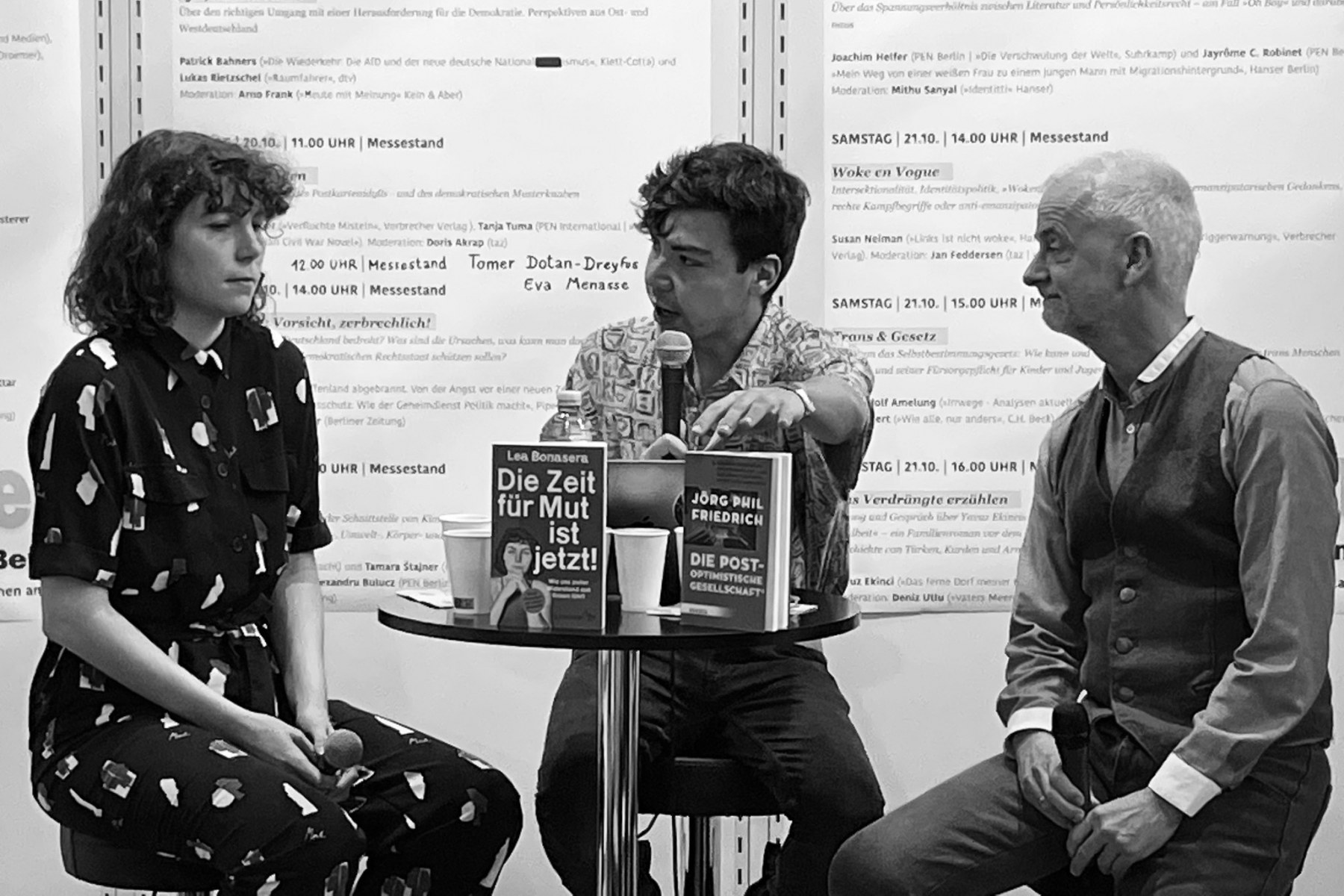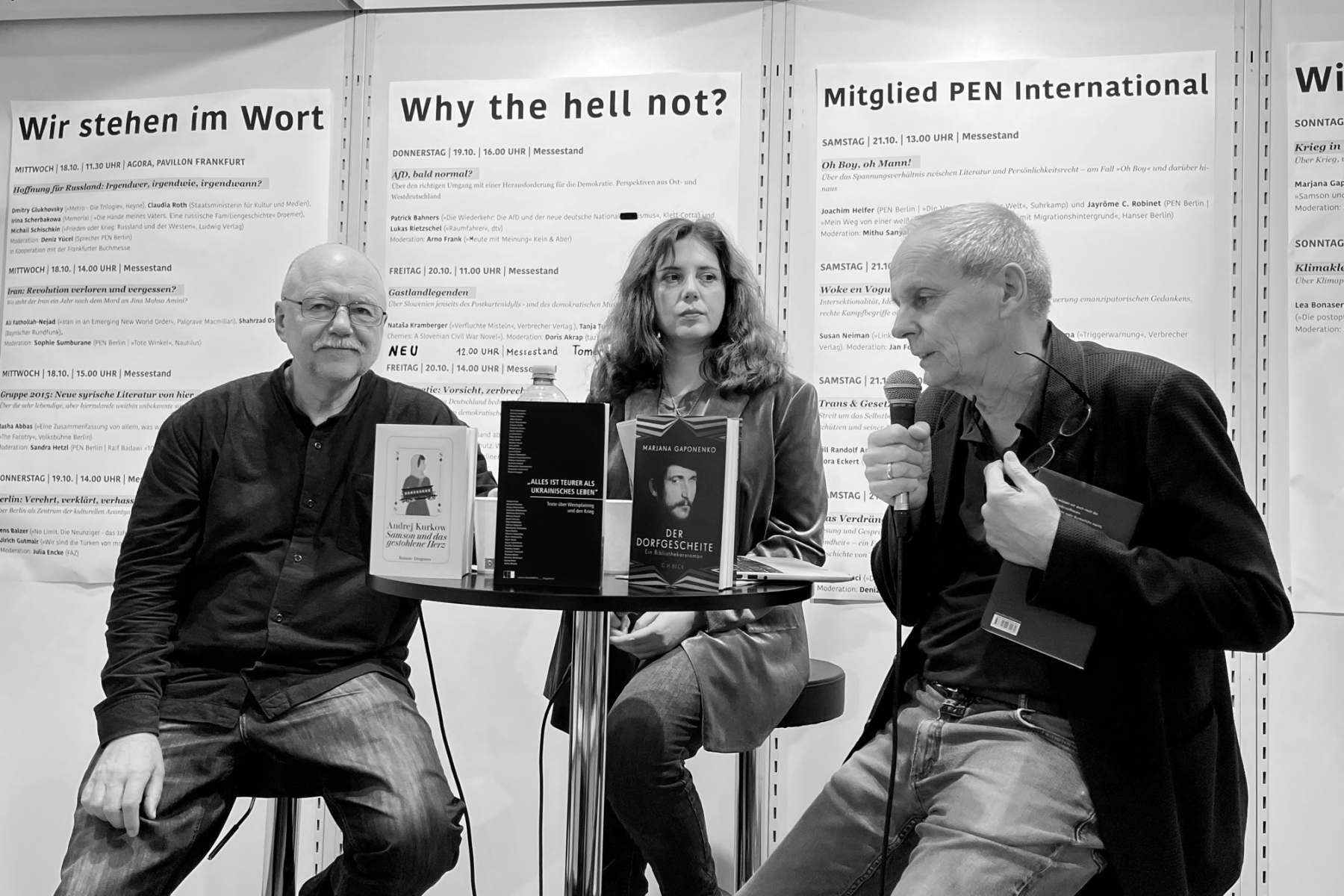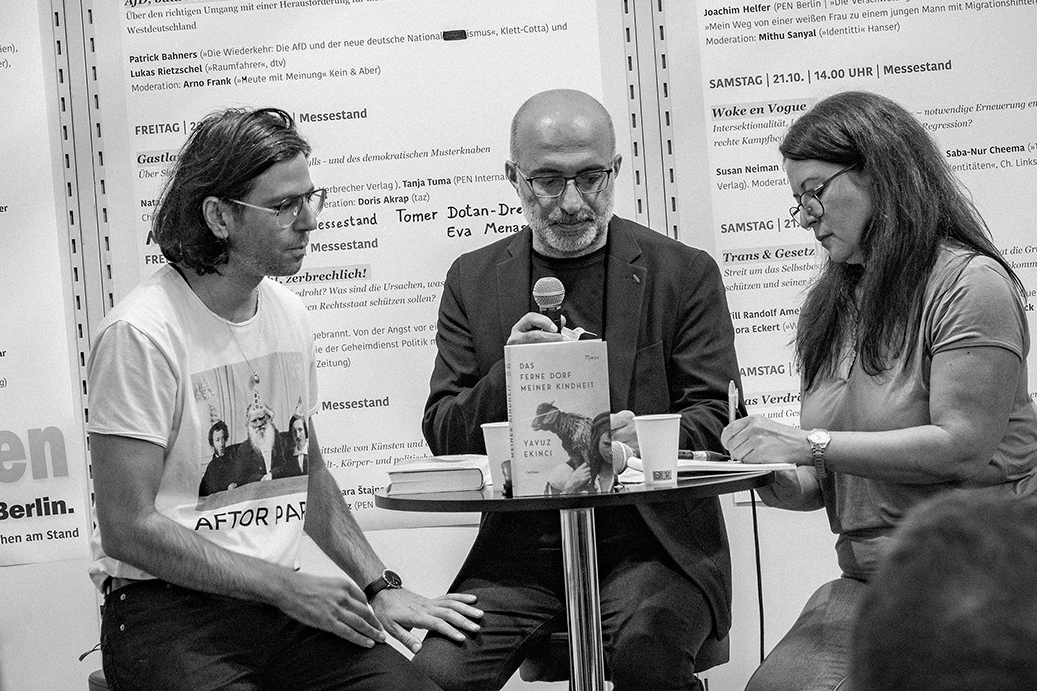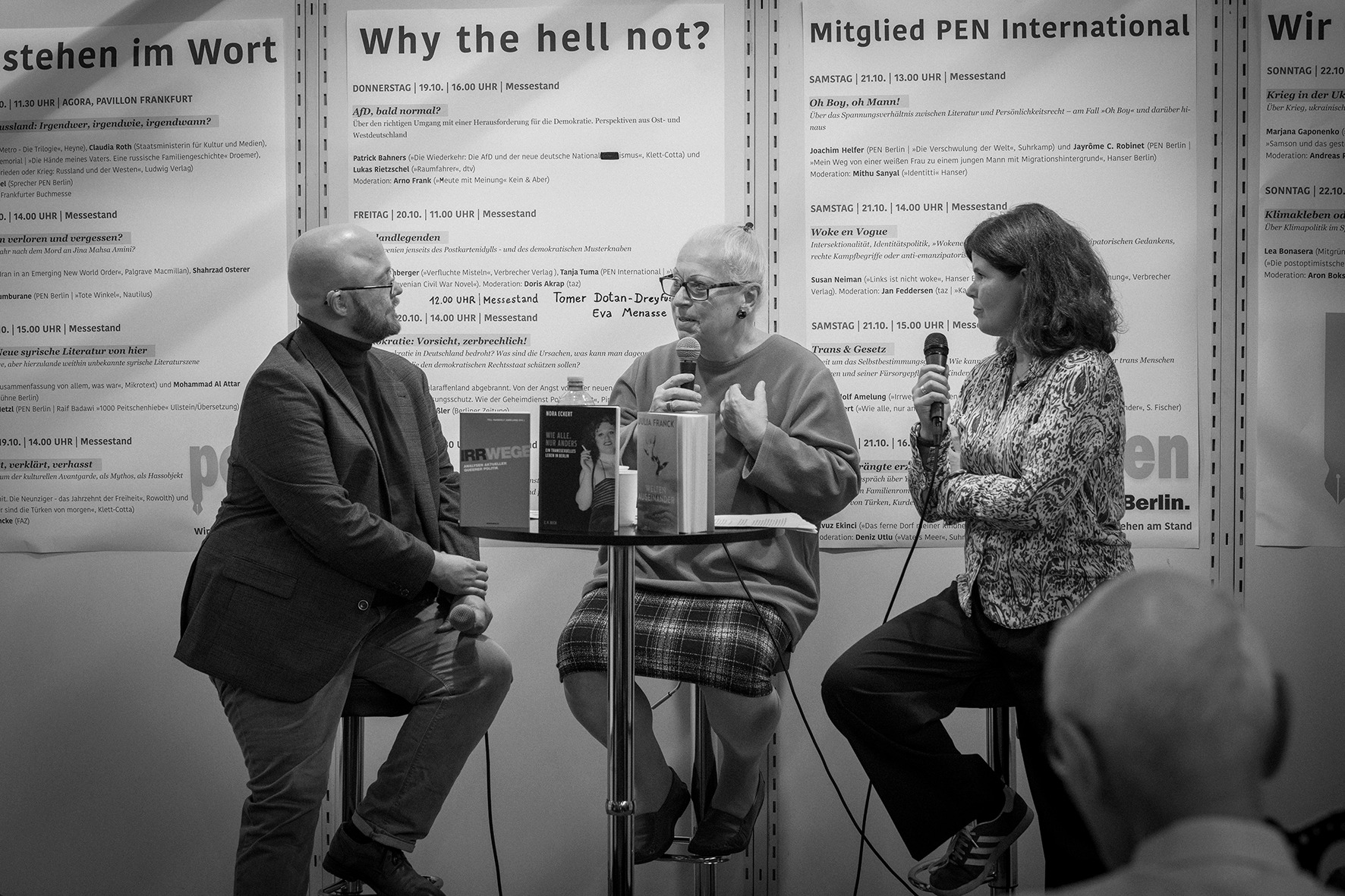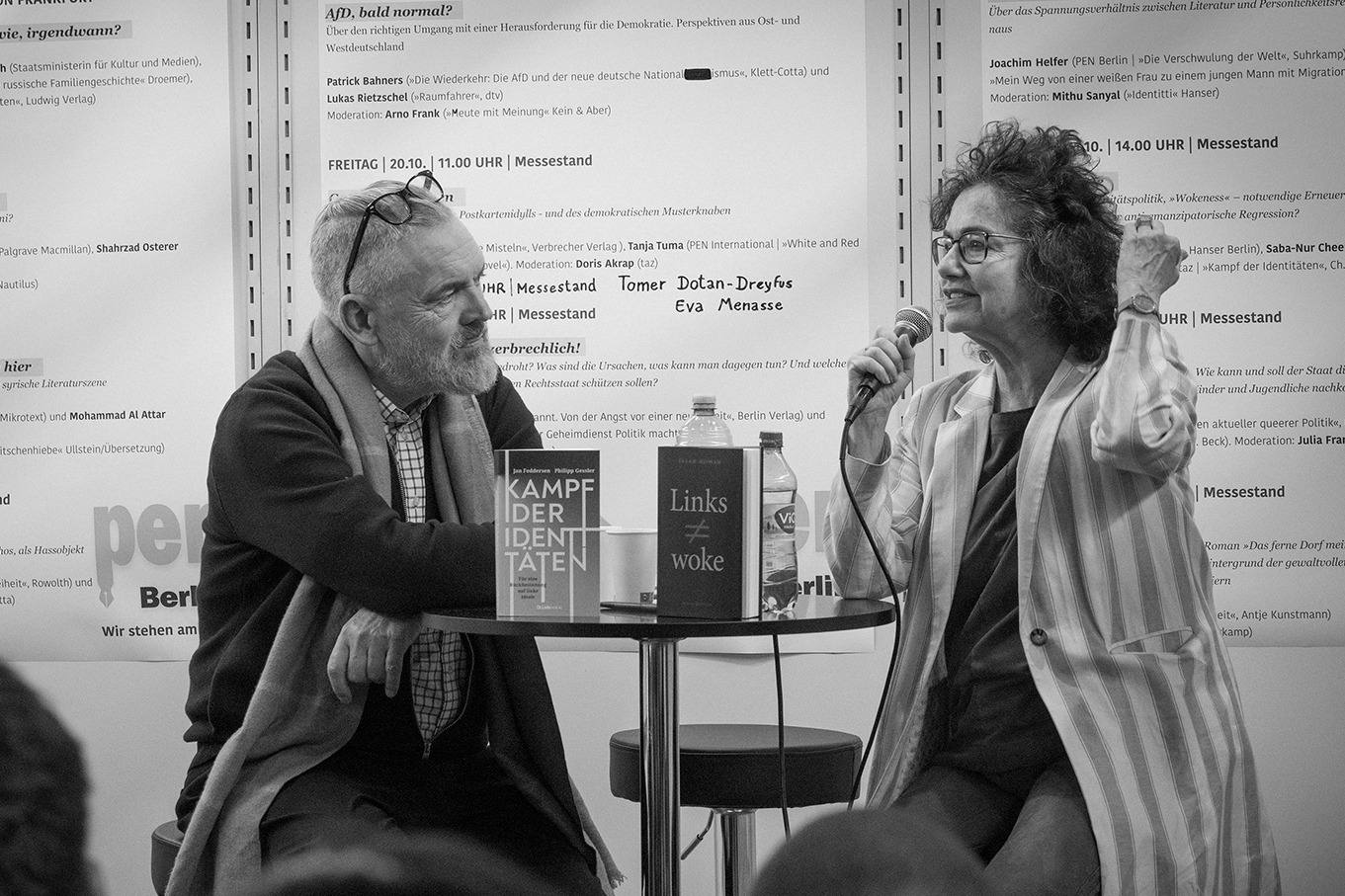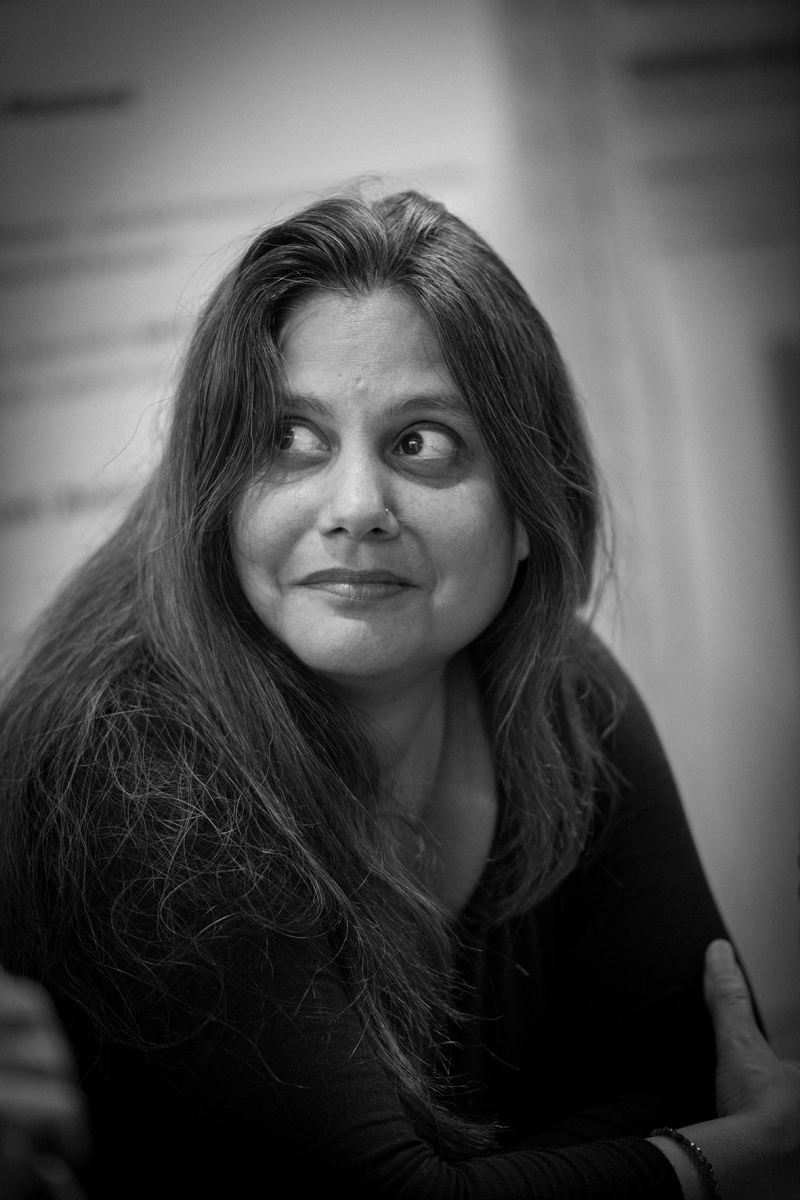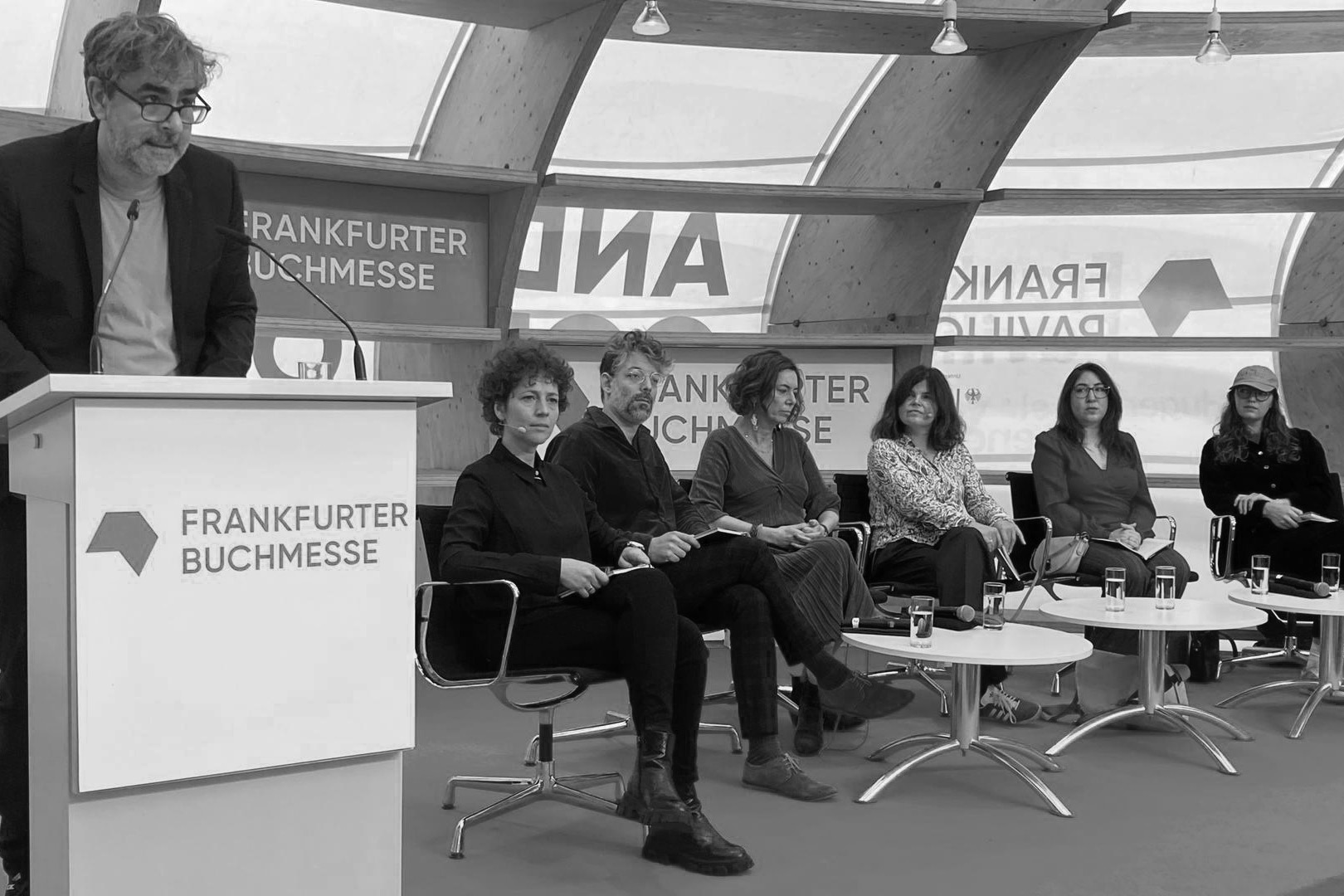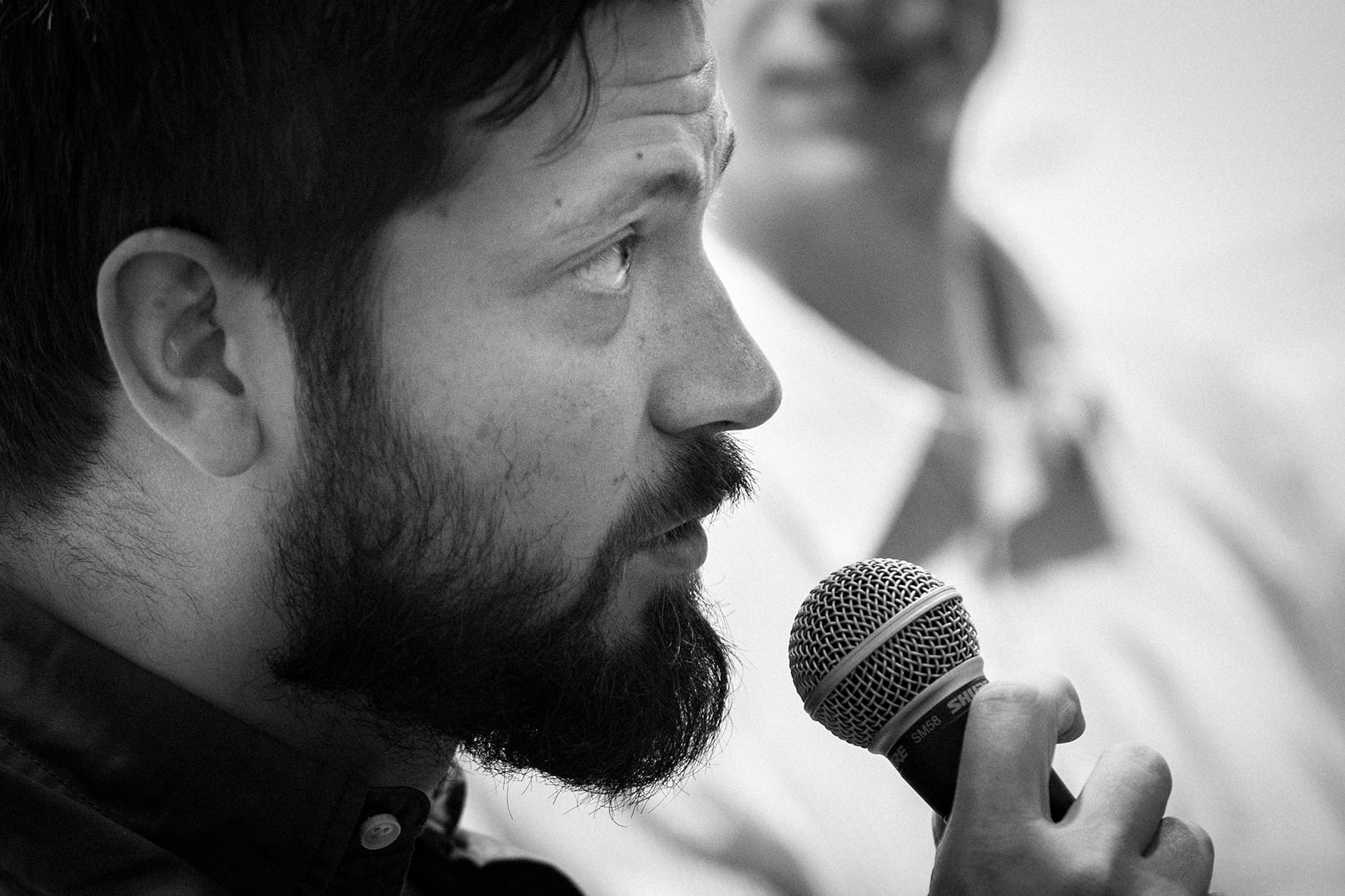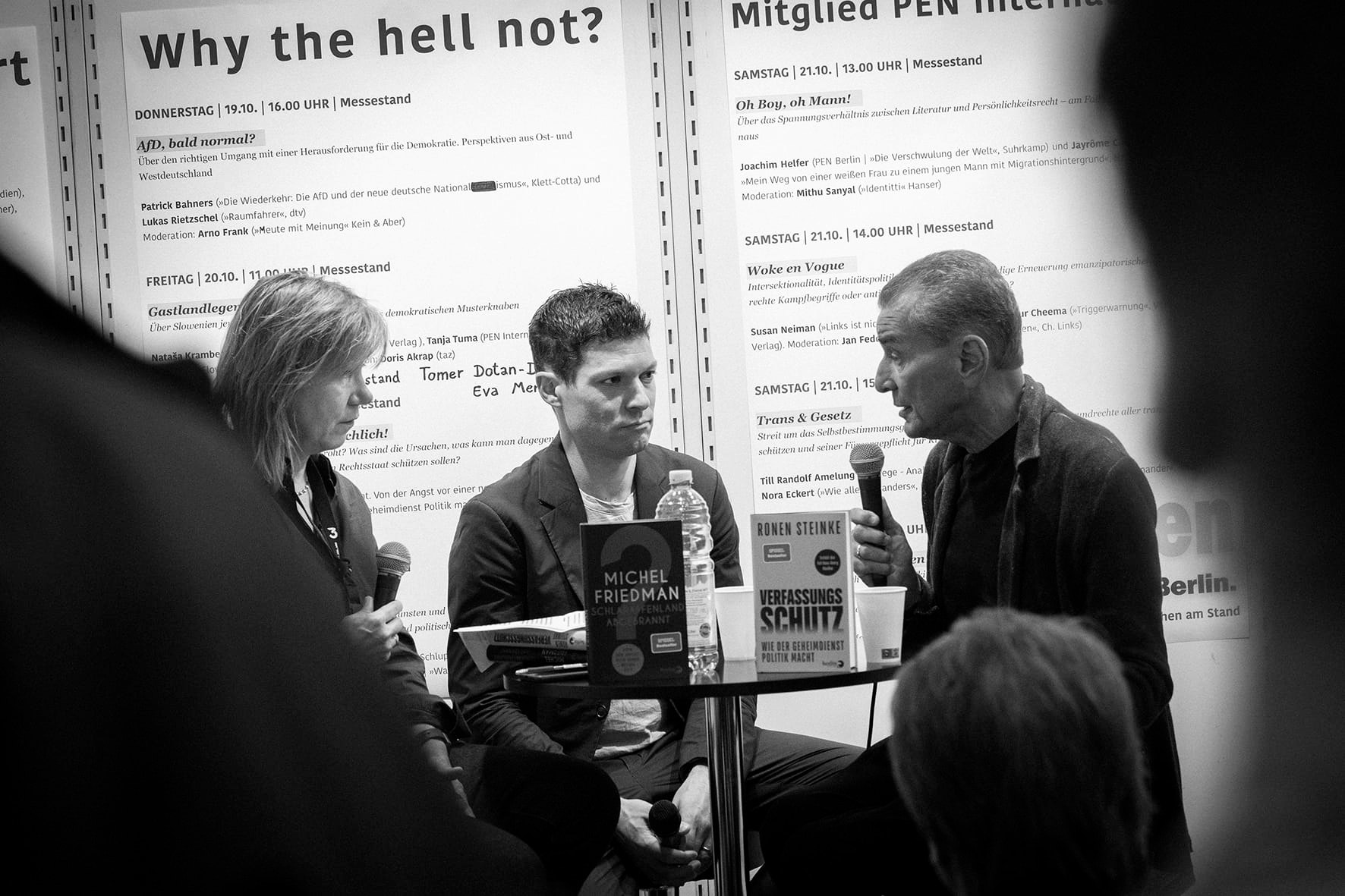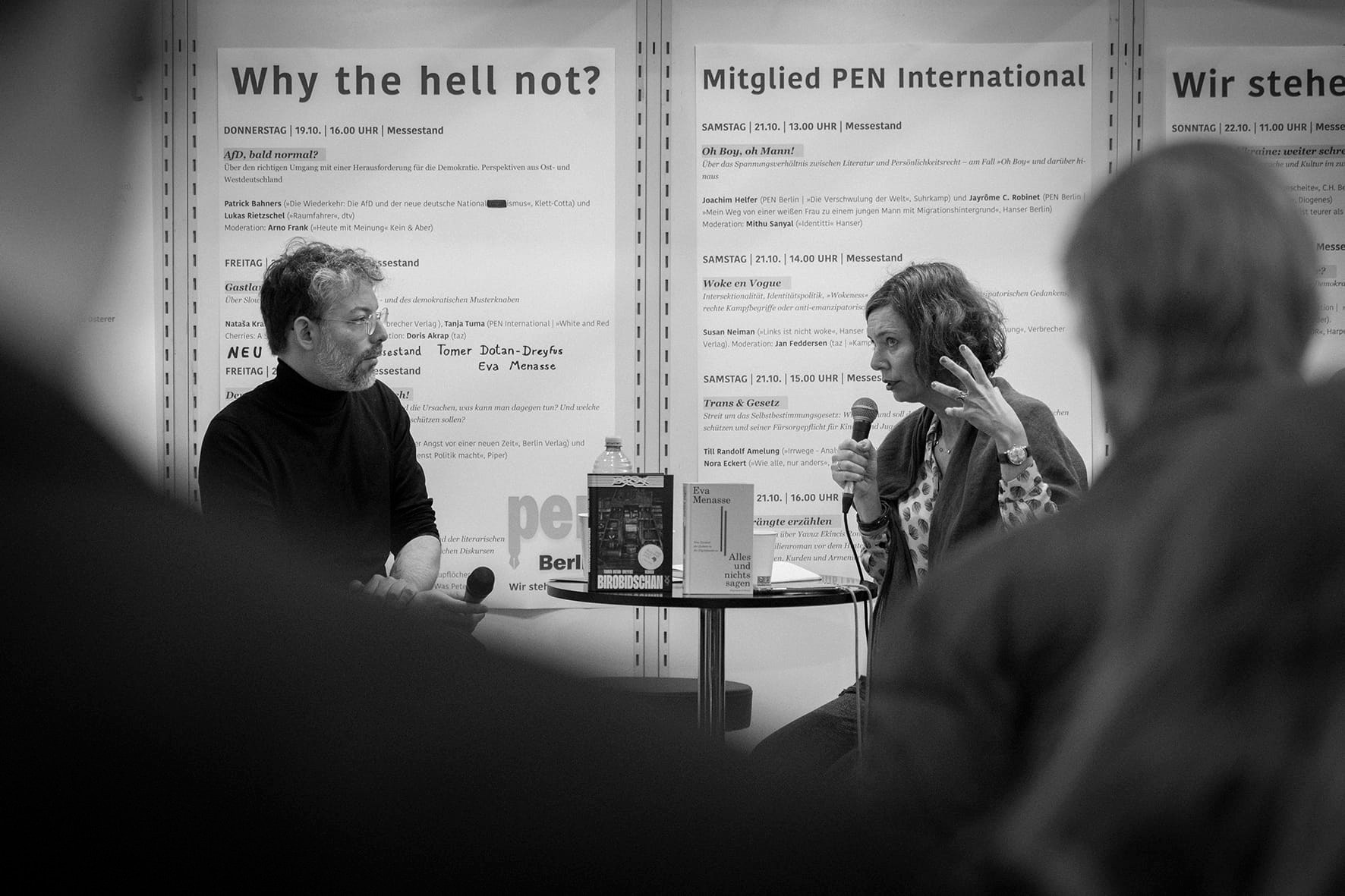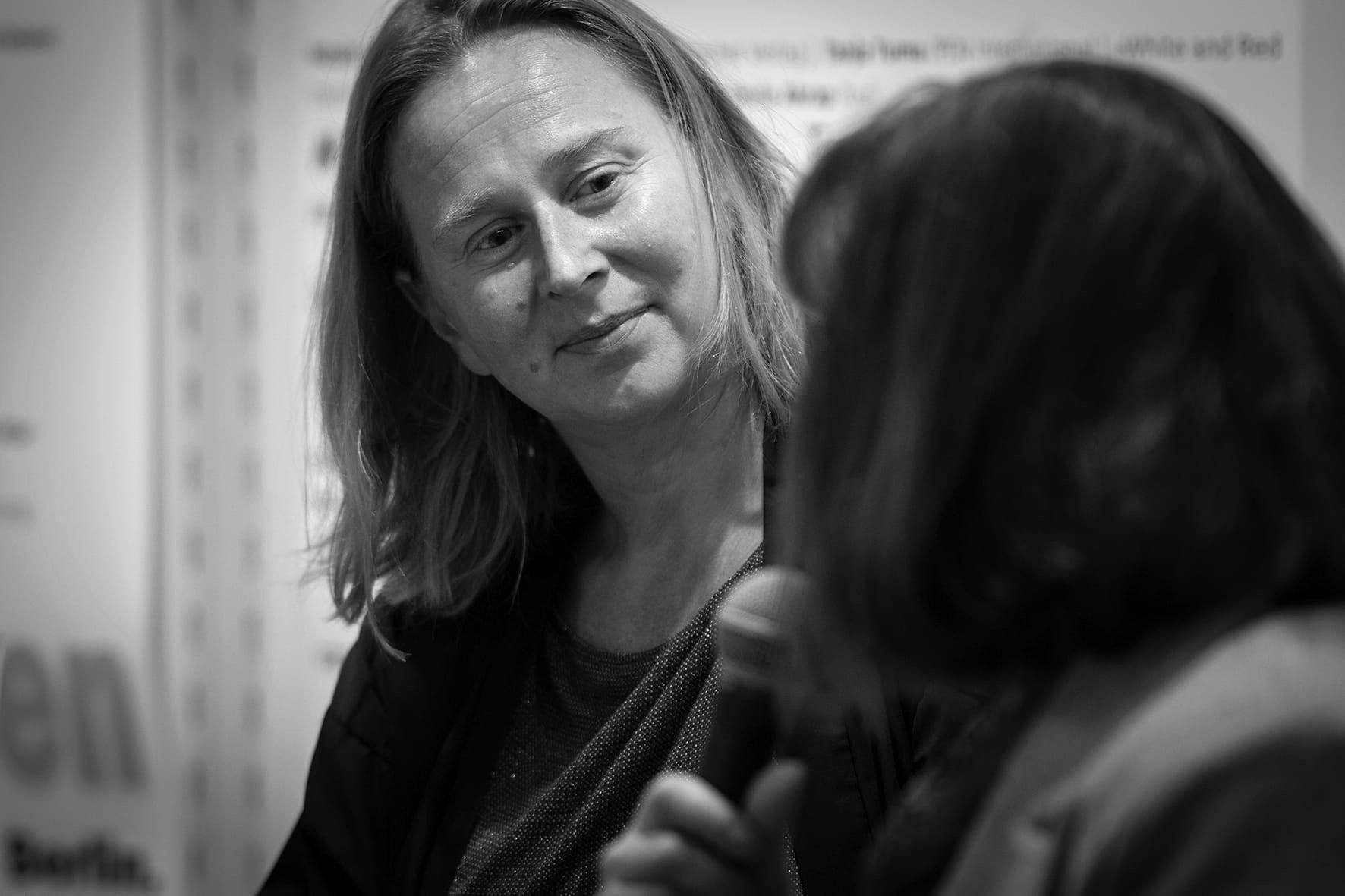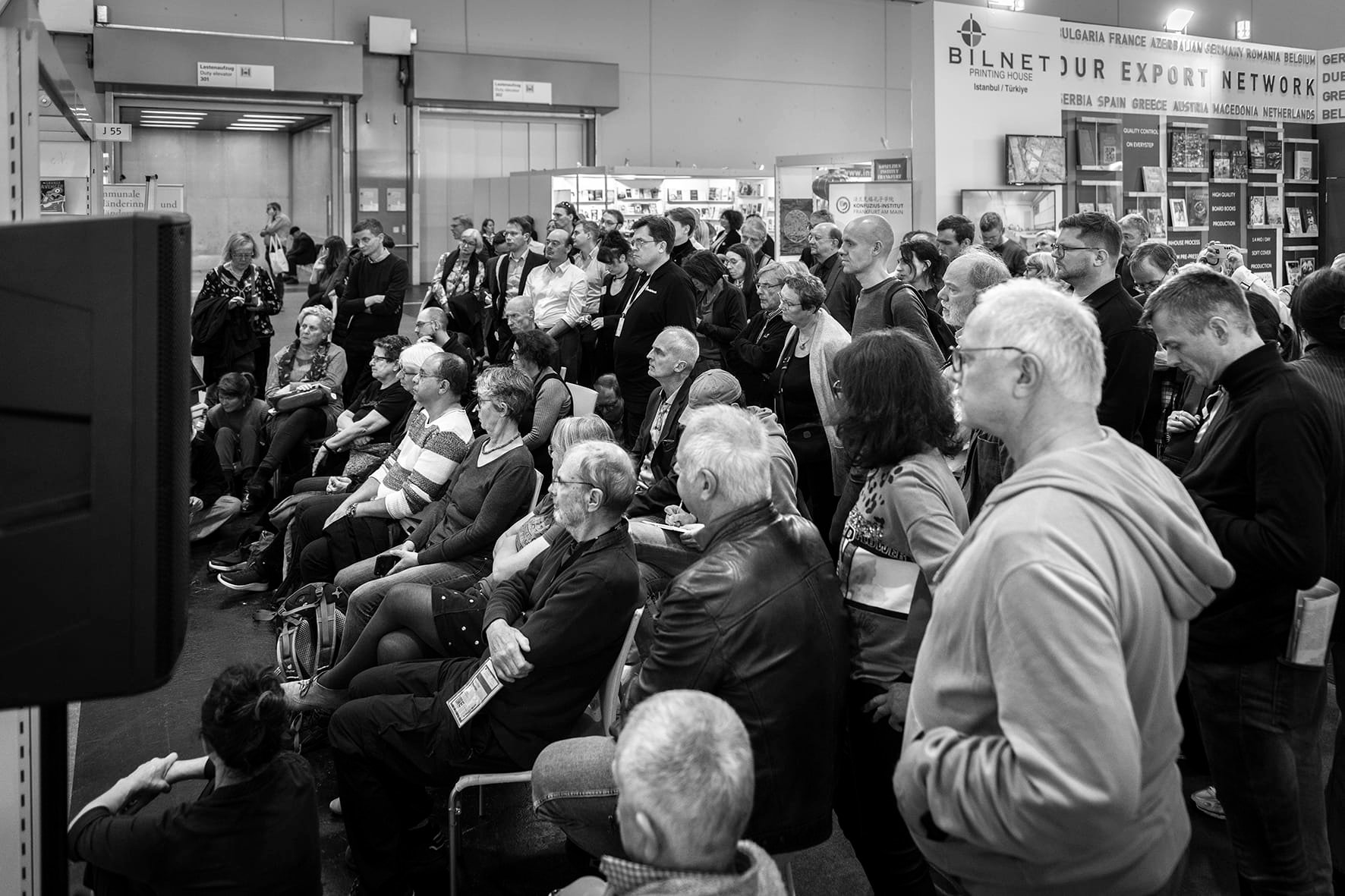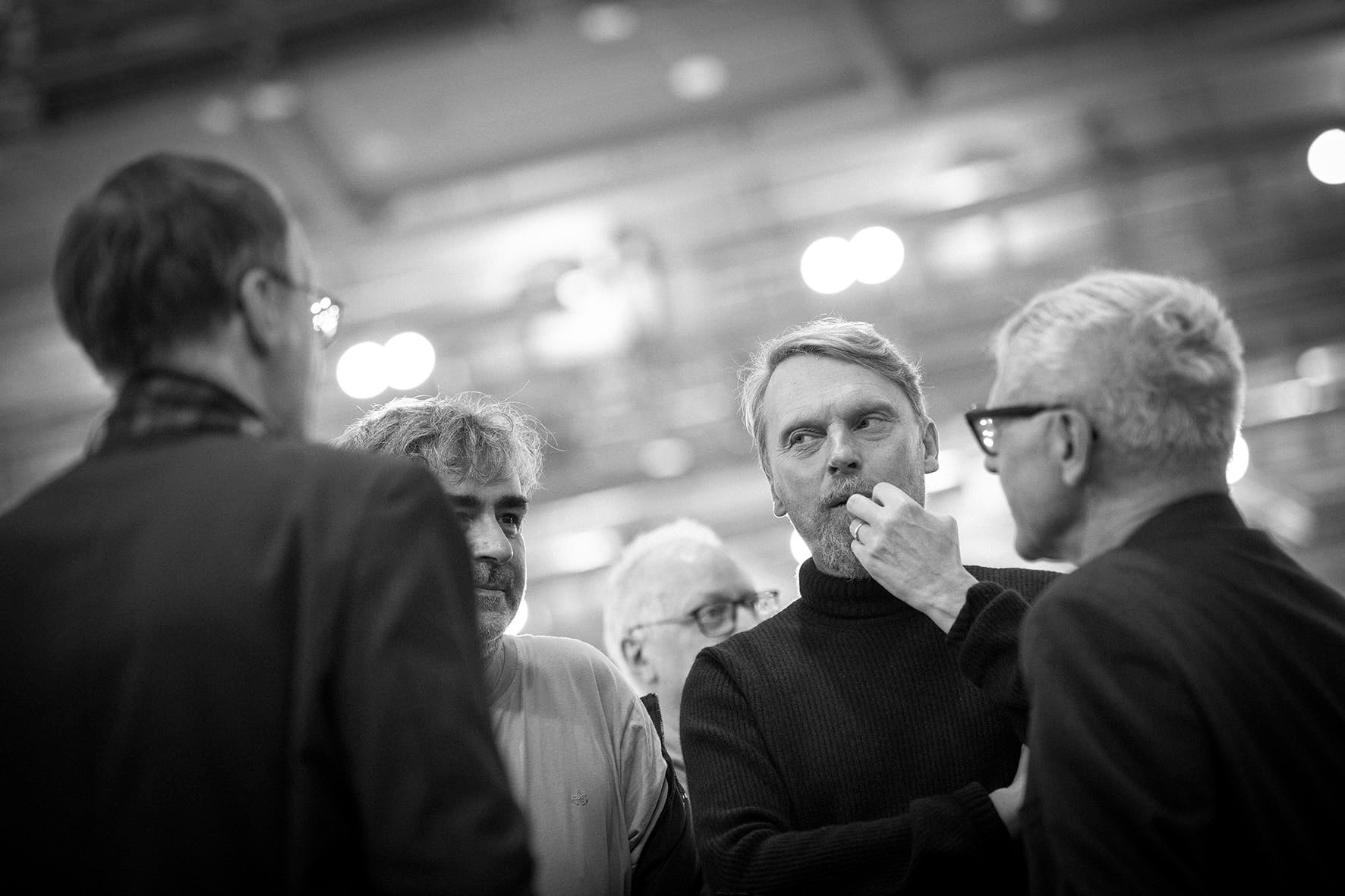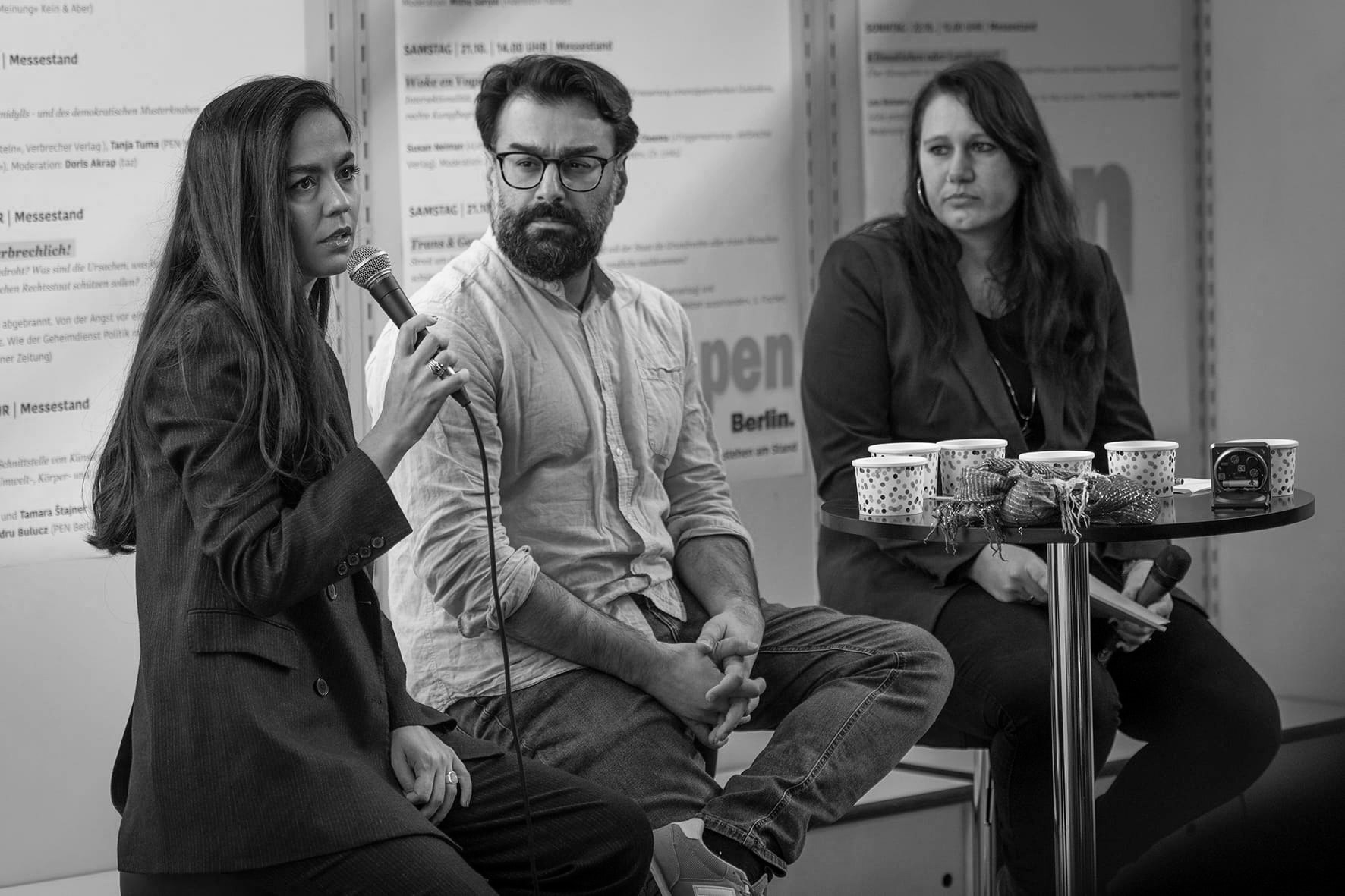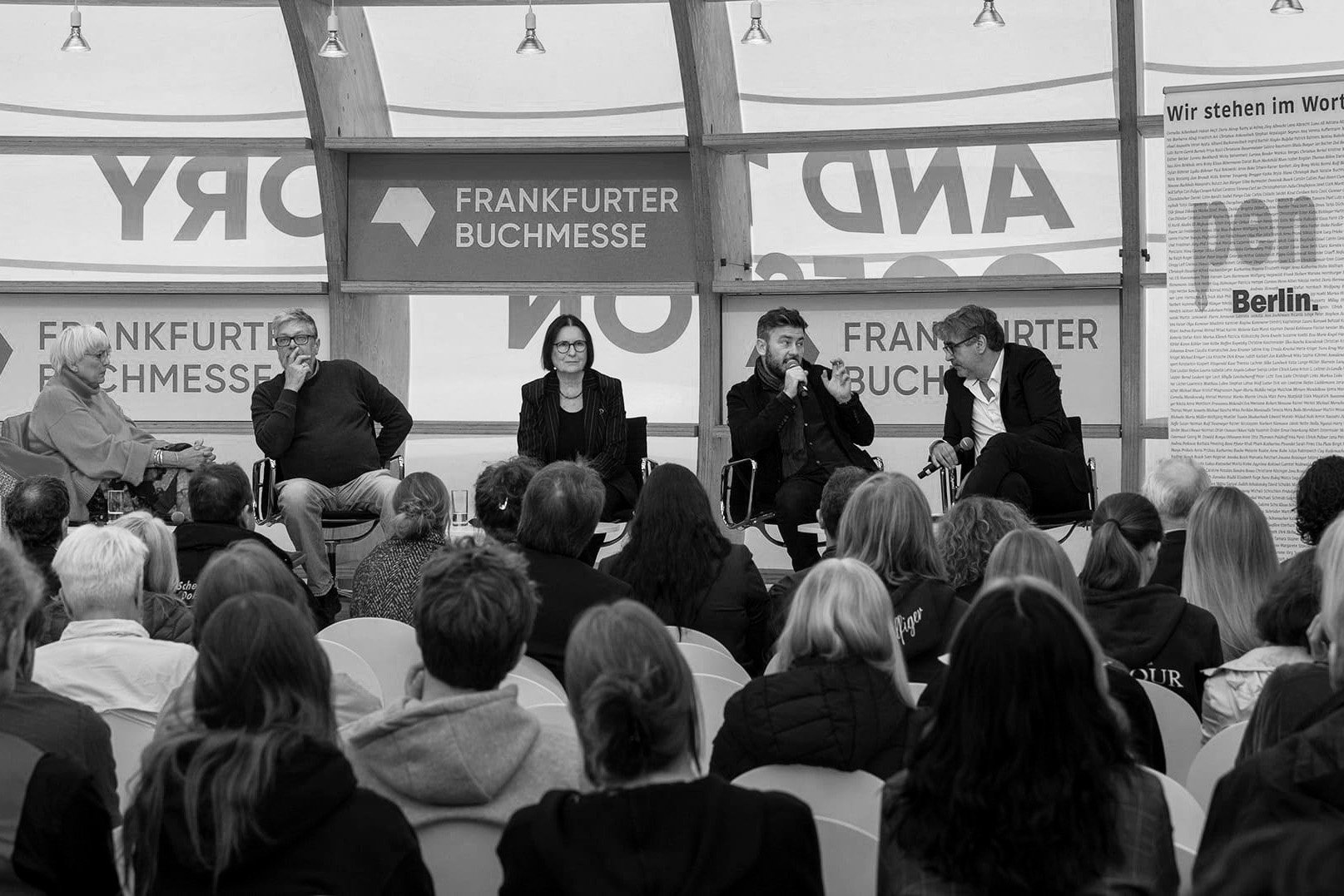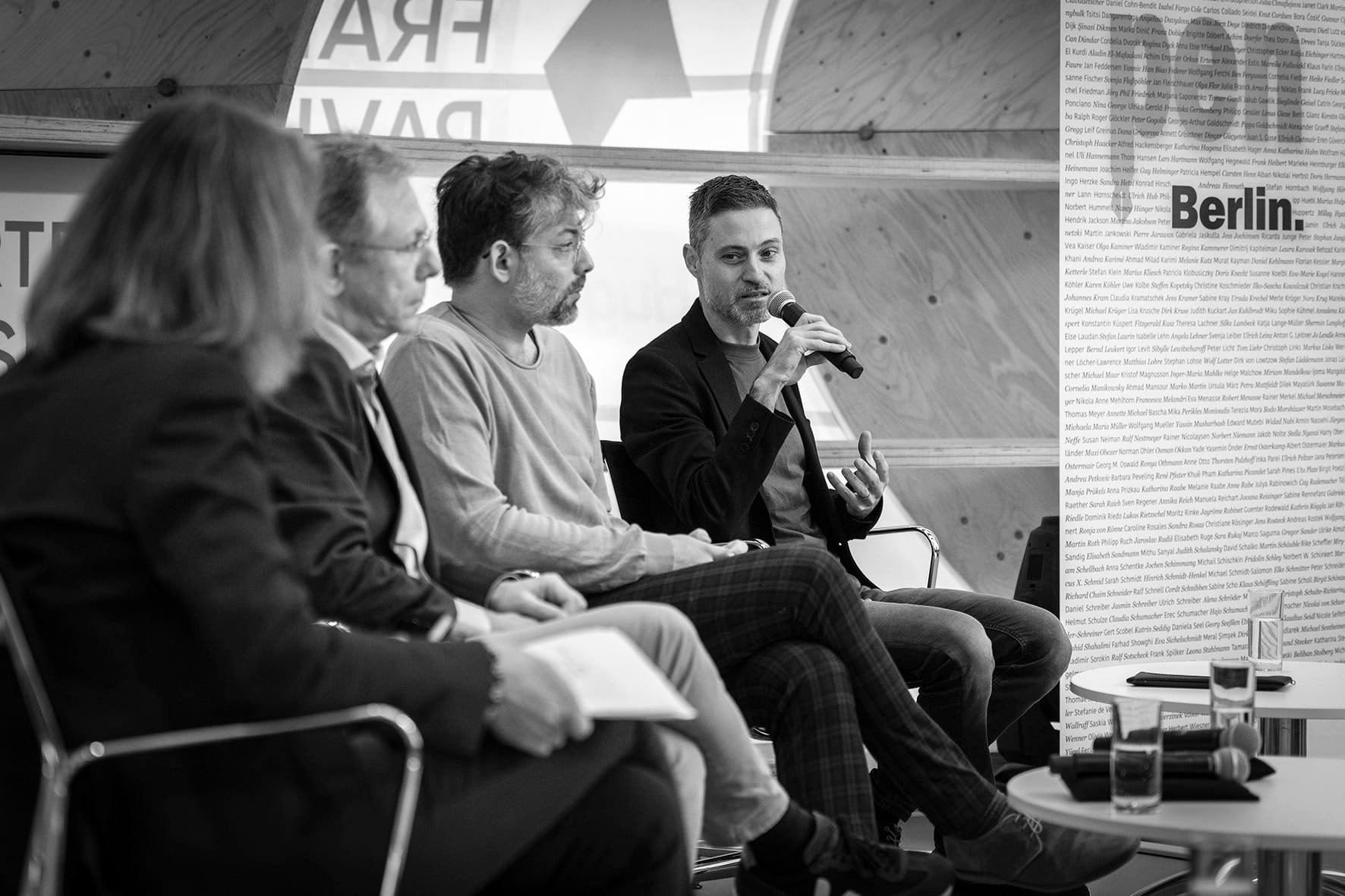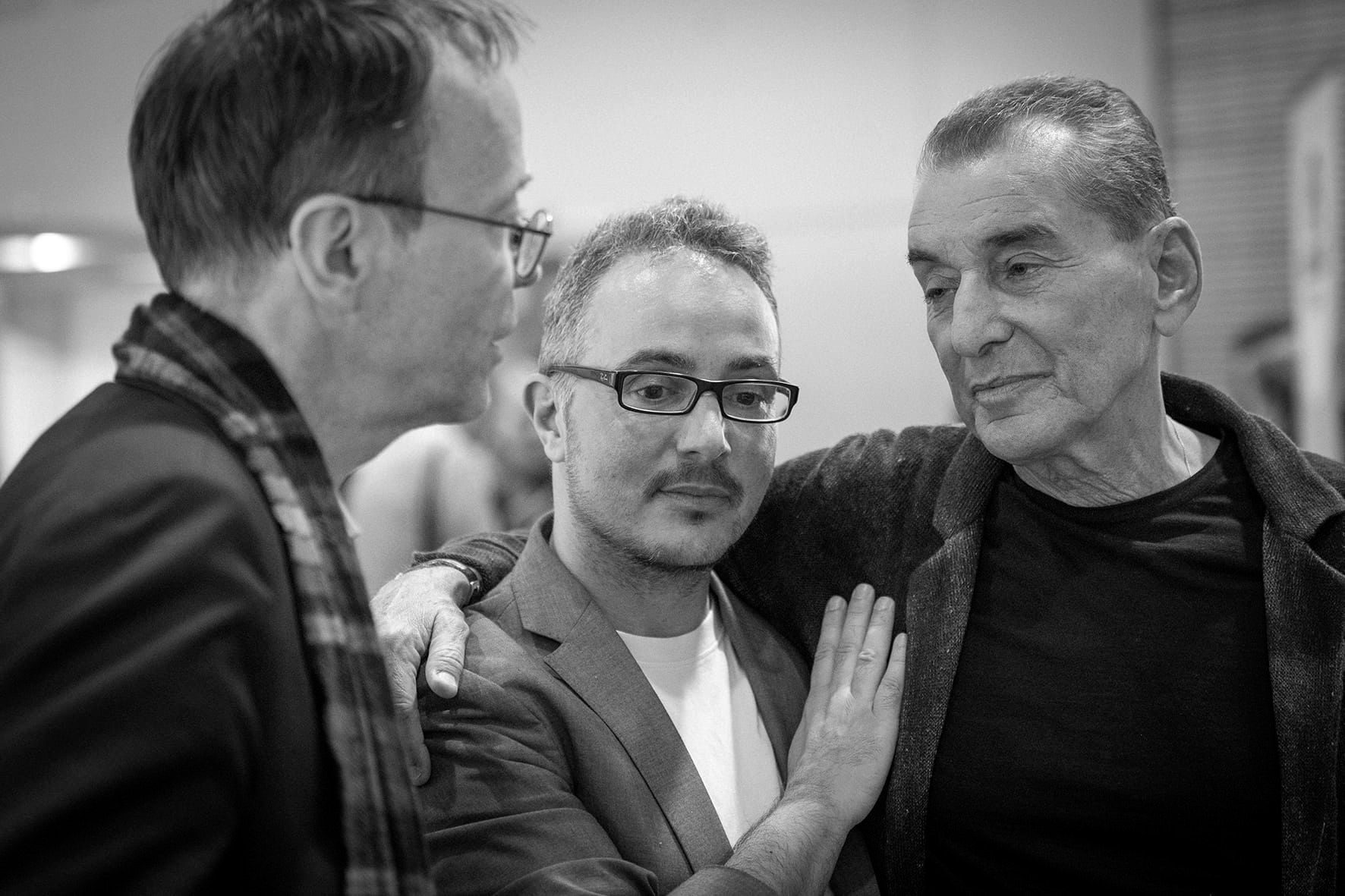PEN Berlin at the Frankfurt Book Fair 2023: Quotes, Photos, Highlights
Climate & Science, Democracy & Protest: Glue Yourself To the road Or Let the World Die?
With: Lea Bonasera (co-founder of Last Generation, activist, author), Jörg Phil Friedrich (philosopher, publicist). Host: Aron Boks (writer, poetry slammer, journalist)
Bonasera: »We split up, optimism and I. But now we are finding our way back together.«
Friedrich: »The history of humanity is the history of surviving disasters. That gives me confidence.«
Bonasera: »Climate protection needs long-term measures, politicians think about the next elections.«
Friedrich: »Prohibitions do not work against majorities in society.«
Bonasera: »The Federal Office for the Protection of the Constitution certifies that we have a high understanding of democracy, because we only ask the government to do its duty.«
Friedrich: »The Last Generation should be less concerned with the approval of the Office for the Protection of the Constitution than with the approval of the population. But there is no sign of that.«
War In Ukraine: Keep Fighting, Keep Writing
Weiter kämpfen, weiter schreiben
With: Marjana Gaponenko (writer), Andrej Kurkow (former President of PEN Ukraine). Host: Andreas Rostek (author, publisher)
Gaponenko: »In this war, everyone is lonely in their own way.«
Kurkow: »Since 24 February 2022, my life has turned 180 degrees (…) I can’t write novels anymore. I can only write about the war.«
Gaponenko: »I go to bed with my smartphone. If there is an air raid alert in Odessa, I find out and stay awake. (…) Humour was my trademark. After the war I won’t write any more bizarre stories, not even with humour. I am recalibrated now.«
Kurkow: »The main printing houses were destroyed at the beginning of the war. There are only small printers left. (…) There will be few novels about this time, few love stories, detective stories, fantasies. There will be more reports, diaries, essays.«
Gaponenko: »It’s time to stop seeing Ukraine through a Russian lens.«
Yavuz Ekinci’s novel »The Faraway Village Of My Childhood«: Telling the Repressed
Das Verdrängte erzählen
With: Yavuz Ekinci (writer). Host: Deniz Utlu (writer). Translation: Ilkay Yücel
Ekinci: »
Utlu: »The situation in Turkey has become worse. A book that begins with a Kurdish phrase could be published in 2014. Today it would probably not be possible.«
Controversy Over the Self-Determination Act: Trans & Law
Trans & Gesetz
With: Till Randolf Amelung (author), Nora Eckert (author). Host: Julia Franck (writer)
Franck: »Why do you need gender in the passport at all?«
Eckert: »Without gender in the passport, most of our laws would have to be rewritten. And there are countries you could no longer travel to.«
Amelung: »We can argue about whether an expert opinion is necessary for a change of personal status, or whether other solutions are possible.«
Eckert: »How you define yourself is also a question of generation.«
Amelung: »For access to medical measures, one could at least get counselling. Or in the context of accompanying therapy one could get a three-line statement confirming that the person is trans. Self-disclosure is not enough.«
Eckert: »I have nothing against counselling. I am active in the Trans Inter Queer Association and we also do peer counselling. But when it comes to changing first names and gender registration, I want to know what counselling looks like and what I have to prove.«
Eckert: »Being trans is not always associated with medicine. Younger people in particular have different ideas about it and don’t necessarily want the rigid binary.«
Intersectionality, »Wokeness«, Identity Politics: Woke en Vogue
With: Susan Neiman (philosopher). Host: Jan Feddersen (journalist). [Author Saba-Nur Cheema had to cancel for health reasons.]
Neiman: »Being oppressed does not legitimise everything you do. You can see that in this Hamas massacre. (…) As Jean Amery said, ›To be a victim is not an honour.‹«
Neiman: »I am a Jewish universalist. But my universalism is a hundred times more important to me than the few genes I may have in common with Itamar Ben Gvir.«
Lliterature and Personal Rights: Oh Boy, Com’on!
With: Joachim Helfer (writer), Jayrôme C. Robinet (writer). Host: Mithu Sanyal (writer)
Robinet: »The reception of texts is not only on a textual level. There is also a paramedial level. And here there is a discrepancy: on the one hand the text claims to be fictional, on the other hand it claims to be based on a real event.«
Helfer: »I don’t have the right to forbid people from doing things I don’t like. Everyone can only tell their own story. The stories of the victims and the perpetrators should be allowed to coexist.«
Sanyal: »In this context, the question for me is: what might an ‘ethics of writing’ look like? And I think it’s a spectrum. We should all consider what such an ethic might look like, even if we don’t agree.«
Robinet: »Legally, the author moves between Article 2 of the Basic Law on personal rights and Article 5 of the Basic Law on artistic freedom. But beyond the legal, there is also the ethical responsibility towards the person you are writing about.«
Helfer: »There is a mixture of private and public space here. We are in the literary business. I see a restriction on what can be said in public. The boundaries in the public sphere are much narrower than those of the civil code.«
Due to Current Events: Reading From Adania Shibli’s Novel »Minor Detail«
Lesung Adania Shibli
With: Julia Franck (writer), Deborah Feldman (writer), Tomer Dotan-Dreyfus (writer), Eva Menasse (writer), Sasha Marianna Salzmann (writer), Dana Vowinckel (writer), Deniz Yücel (journalist)
Yücel: »As PEN Berlin, we refute insinuations that Adania Shibli sympathizes in any way with the murderers of Hamas. However, we also do not share the view that Palestinian voices are not heard in Germany and that no one is interested in the suffering of the Palestinians. (…) What is missing, however, are Palestinian voices – intellectuals, artists, activists (…) who do not leave opinion leadership to the religious or secular radicals on the streets.« MORE
Adania Shibli: »From my sad silence, I thank them, you and the audience. This attention confirms for me that literature is a lifeline for many of us.« MORE
Guest Of Honour Poetry:On Poetry From Slovenia
With: Uroš Prah (writer), Tamara Štajner (writer). Host: Alexandru Bulucz (writer)
Štajner: »When we speak, we are basically doing exactly what we do in music when we improvise.«
Prah: »Language is violence.«
Democracy: Caution, Fragile!
19.10.23-Demokratie_5a
With: Michel Friedman (author), Ronen Steinke (journalist). Host: Cornelia Geißler (journalist)
Steinke: »Yes, we live in the best of all Germanies. But a look at history shows: The bar is not very high, so the compliment is not that great.«
Friedman: »Racism cannot be eliminated ‘from above’. We should all ask ourselves: how do we talk about homosexuals? About minorities?«
Friedman: »If we demand integration from migrants, why don’t we demand it from Mr Höcke? And I don’t mean that ironically. It’s because we always demand more from ‘foreigners’. These are double standards.«
Steinke: »It was investigated how anti-constitutional the AfD is. The result was a thousand-page report. What happened to this report? I describe this very gleefully in my book.«
Friedman: »We don’t need endless reports on racism, it’s not a marginal problem. We actually experience it if we look carefully. All of us.«
Friedman: »My journalist colleagues took a Hamas report and ran with it in 90 seconds. Why did they do that? Because Jews are believed to be so brutal. All journalistic care was forgotten. It frightens me.«
After Oktober 7: The Loneliness Of the Jewish Left
Die Einsamkeit der jüdischen Linken
With: Tomer Dotan-Dreyfus (writer), Eva Menasse (writer)
Dotan-Dreyfus: »I think there is an imaginary of Israel in Germany that bursts when you suddenly know someone who doesn’t want to live there, but in Germany.«
Dotan-Dreyfus: »All the fears that the Israeli left had before 7 October are now coming true. You’re not allowed to protest anymore, posters saying ‘No racism’ are being removed, people are losing their jobs because of critical posts on Facebook.«
Menasse: »When we talk about Israel, which Israel are we talking about? The government? The Israeli people? Or Israel’s right to exist? And this constant invocation of the right to exist somehow gives the impression that it should be doubted. That is how I feel.«
Guest Of Honour Legends: Slovenia Beyond the Postcard Idyll
Gastlandlegenden
With: Nataša Kramberger (writer), Tanja Tuma (writer). Host: Doris Akrap (journalist)
Tuma: »My book ‘White and Red Cherries’ is about the Second World War. But it’s mainly about the women. The men are just there to carry on the story.«
Kramberger: »My grandmother used to tell me: ‘Hunger will come. When there is no more rain, there will be no more food. Later a famous person said the same thing. That’s when I understood that every intimate story is also a human story.«
About the Right Way to Deal With a Challenge: AfD, Soon Normal?
With: Patrick Bahners (journalist), Lukas Rietzschel (writer). Host: Arno Frank (journalist)
Rietzschel: »The AfD’s supposed answers to social ills are no answers, because they predictably fail. Because for them it’s not about democracy.«
Bahners: »They operate with populist clichés. They say that society is terribly afraid of them, instead of calmly pointing out the facts. That would give the impression that there is a recognisable debate going on and that the AfD’s propaganda is not being swallowed.«
Rietzschel: »Anger and fear are not necessarily driving forces for voting for right-wing parties. But they rise when they can dictate the discourse. That’s where the wind is blowing.«
On Berlin Hype & Berlin Hate: Loved, Romanticised, Hated
Berlin: Verehrt, verklärt, verhasst
With: Jens Balzer (journalist), Ulrich Gutmair (journalist). Host: Julia Encke (journalist)
Balzer: »Every generation in Berlin has the feeling of having missed out on something. Berlin constantly creates myths and gives you the feeling that you’ve missed something.«
Gutmair: »Now there’s the anti-myth: Berlin as a symbol for everything that doesn’t fit. Even politically.«
Iran: Revolution lost and forgotten?
Revolution verloren und vergessen?
With: Ali Fathollah-Nejad (political scientist), Shahrzad Osterer (journalist). Host: Sophie Sumburane (writer)
Osterer: »After the Islamic revolution in 1979, the new rulers first curtailed women’s rights because they knew how important women were for Iranian society. Back then, only women protested. Now it’s different.«
Fathollah-Nejad: »In the West we tend to have a seasonal view of events in the Middle East. Last year people were talking about ‘revolution’, now they think it’s all over and they want to negotiate with the regime again. In fact, it is a revolutionary process.«
Fathollah-Nejad: »It’s still simmering, the revolutionary process is still going on, it’s just a matter of time before it breaks out again.«
Osterer: »People who have been in prison in Iran for 30 years do not stop addressing Iranian society in letters and writings from prison. (…) That is why support from abroad is also important.«
Hope For Russia: Somebody, Somehow, Sometime?
Hoffnung für Russland?
With: Dmitry Glukhovsky (writer), Claudia Roth (Kulturstaatsministerin), Irina Scherbakowa (Historikerin), Michail Schischkin. Host: Deniz Yücel (journalist)
Schischkin: »Last year we were sitting here and I never thought that the world situation could get worse. It has got worse. We held an event in Israel on the freedom of Russian culture. Now all our colleagues there are also in danger.«
Scherbakowa: »People say that under Putin it’s the same as before. But Russia is different now. There is no planned economy, for example. The market economy gives additional stability to the regime. Many people around Putin have accumulated fabulous wealth and they will defend it.«
Glukhovsky: »In 1985, under Gorbachev, we had a vision of freedom for Russia. There was a generation that was open to the world, but Putin wanted to bring them back into slavery.«
Glukhovsky: »Russia had a future, there was a younger generation that wanted freedom. Only these freedom fighters of internal emigration have long been in exile or in prison. Russia still lives in fear and is dominated by conformism. In every family there is someone who warns what will happen to their relatives if they resist.«
Scherbakowa: »There is no other chance than for Russia to lose the war against Ukraine. If that doesn’t happen, I’m pessimistic.«
Schischkin: »In Russia you have to sing patriotic songs or keep quiet. Russian culture can only take place in exile.«
Scherbakowa: »It is true that we have not fought enough against Putin.«
Roth: »We have to make it clear that the Russian language, Russian culture, is not Putin’s property. There is another Russia – and we must give it a voice. A cultural boycott primarily affects these critical voices.«
Due to Current Events: In concern for Israel
18.10.23-Israel_2
With: Tomer Dotan-Dreyfus (writer), Meron Mendel (author und Direktor der Bildungsstätte Anne Frank, Doron Rabinovici (writer und Historiker). Host: Esther Schapira (journalist und author). [Author and sociologist Eva Illouz had to cancel for health reasons.]
Mendel: »Every person on the planet who has a moral compass should feel targeted by Hamas’ terror. Because anyone who is not like them is meant.«
Rabinovici: »It would a bit obscene to say to my relatives in Israel that I feel threatened too. I have this survivor’s guilt towards all my compatriots.«
Dotan-Dreyfus: »This anti-Semitism that exists in Germany, we have to solve it in Germany and not transfer it somewhere else.«
Mendel: »Just like the names Sabra and Shatila, Srebrenica or Butscha, the names Be’eri, Kvar Azar are on this list of inhumanity. What is missing is the recognition of absolute evil – without ifs and buts. Only when we have this common ground can we talk about anything, including Netanyahu and what Israel has done wrong. But when it comes to sheer inhumanity, there is no need for contextualisation. There is nothing to discuss about Kfar Aza, Be’eri and Nahal Oz.«
Rabinovici: »We are against war crimes, but I am glad that I am a writer in Vienna and not a commander.«
Dotan-Dreyfus: »The fact that Israel exists as a safe haven for Jews allowed me to live in Berlin. This certainty has been destroyed.«
PEN Berlin at the Frankfurt Book Fair
Wir stehen am Stand
Board members and stuff of PEN Berlin

